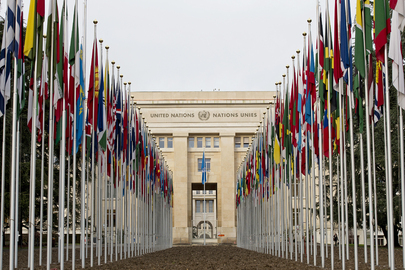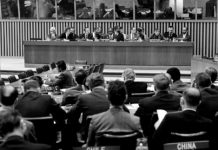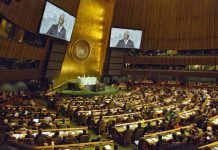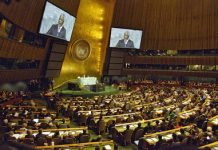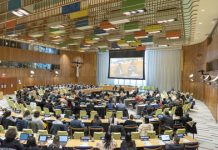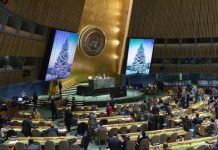Interview transcript
Secretary-General, welcome to this interview with UN News. In a few days, world leaders are going to gather in this chamber. How would you describe the state of the world that is the backdrop for this General Assembly?
Secretary-General: We are facing a global crisis. Conflicts are multiplying in the context in which geopolitical divides do not allow to effectively address them.
There is a sense of impunity – every country believes they can do whatever they want. On the other hand, we see that developing countries are facing enormous difficulties. Many of them drowning in debt without access to concessional funding that they require to redress their economies. Inequality is growing.
On the other hand, climate change is not yet under control. And we have several signals that, it will probably be very difficult to maintain our central objective, which is to keep global warming below 1.5 degrees.
And technological developments are largely without guardrails. And, of course, they have an enormous potential, but the risks are there. And some of the risks can be witnessed today: Supporting the polarization of societies; increasing the divisions within societies; hate speech is growing.
We absolutely need leaders to come here and to turn the tide…to come here and to reaffirm multilateralism – that we cannot solve all these problems alone
So in this context, we absolutely need leaders to come here and to turn the tide. To come here and understand that international cooperation is vital in a moment like this. To come here and do the negotiations and the mediations that are necessary to, at least, create hope for peace in some of the situations we are facing.
To come here and to make strong commitments in relation to the reduction of emissions to address climate change. To come here and to accept the need for the reforms of the international financial architecture to have more justice and more equality in international relations.
To come here and to accept some forms which, of course, are soft but some forms of governance of artificial intelligence and new technologies that make sure that human agency is preserved and that they become a force for good.
And, essentially to come here and to reaffirm multilateralism – that we cannot solve all these problems alone.
This is my hope. And we’ll do everything possible to make this summit a success and to ask the world leaders to assume their responsibilities in a moment of global crisis.
And indeed, there are going to be a number of summits convened during the General Assembly around peace and security. There is going to be a two-State solution conference and a number of meetings on ending some of the wars that have been raging across the world. What do you hope these meetings will achieve?
Secretary-General: Well, first of all, I believe that there will be a clear, clear demonstration that the overwhelming majority of the countries in the world recognize the right of the Palestinian people to self-determination; recognize that there must be a Palestinian state and recognize it in the meeting we will have on Monday.
And, at the same time, send a very clear message that the carnage that is happening in Gaza has to end, that we need a ceasefire immediately with the release of all hostages immediately too. And with effective humanitarian aid in Gaza that is suffering the highest level of death and destruction that I’ve seen since I’m Secretary-General.
On the other hand, to have a clear, clear affirmation that there is no alternative to the two-State solution – a one-State solution in which the Palestinian people would have no rights and that many of them would be kicked out of their land is something completely unacceptable in the 21st century.
The only way to have hope for peace in the future and the only way to fight extremism in the world, is to reaffirm the two-State solution and not to allow annexations
And so, the only way to have hope for peace in the future and the only way to fight extremism in the world, is to reaffirm the two-State solution and not to allow annexations; not to allow the continuation of this dramatic destruction in Gaza; to create the conditions for the two peoples, the Jewish people and the Palestinian people; to understand that they need to live in peace and security.
This will also be the venue for looking at the situation around a number of other conflicts, some of them that have been called “forgotten”, like the war in Sudan.
What do you hope could possibly be achieved next week, when world leaders come together and focus on some of these “forgotten” conflicts.
Secretary-General: We have too many actors messing up in Sudan. And, this is an occasion, for namely the big powers. The suffering of the Sudanese people is horrible. So, I think it’s time for the Security Council to be able to take – with the agreement of all the key powers – very tough measures on Sudan, to make those Sudanese parties understand that what they are doing is a crime against their own people.
Can you just say something about just war in general? What does it do to people and what are the ripple effects around the world?
Secretary-General: Well, as divisions are high, and, as we have not the instruments to guarantee accountability – as we live in a world of impunity – it is easy for countries that see the examples of big powers waging war, as in the case of Ukraine.
There is a stimulus for mid-sized countries to try to solve their ambitions or their problems through war – instead of negotiation, instead of compromise. And this is becoming a pattern that needs to be strongly opposed by the international community.
We would need a much more united and effective Security Council to make it happen.
And we would need a much more united and effective Security Council to make it happen. That’s why the reform of the Security Council is so important.
You’ve seen the fallout of these wars. You were High Commissioner for Refugees and you’ve visited war zones and refugee camps and saw what it means to have to flee from wars. What is your message to all of those people? We have 122 million forcibly displaced people in the world today. How can this end?
Secretary-General: My message for them is a message of solidarity. But the most important message is to the countries in the world that have obligations under international law under international refugee law, that their doors must be open, that refugees must see their rights respected, and that, of course, all must do everything possible to reestablish peace in their lands, for them to be able to go back home.
But, with doors closed and with conflicts that do not end, we see those refugees lost, with no rights and in a very dramatic situation. And, to make things worse, UNHCR that has a fantastic role in supporting refugees all over the world, is now dramatically underfunded.
So this is a tragic situation that requires a comprehensive response for refugee rights to be respected and for refugees to be supported.
At the GA (General Assembly), you’re also going to be chairing a Climate Solution summit. What have you asked Member States to come to the table with?
Secretary-General: This is a moment in which every Member State must present its new climate plan. And it is essential that those climate plans are aligned with the objective of 1.5 degrees, which means that they bring a dramatic reduction of emissions.
And, at the same time, that those nationally determined contributions, those climate plans, cover the whole of economy, cover all greenhouse gases and create the conditions for the 1.5 degree limit to remain as a possibility, because the risk is that we are on the verge of making it irreversible, the impossibility to keep global warming contained at that level.
It is essential that [the national] climate plans are aligned with the objective of 1.5°C, which means that they bring a dramatic reduction of emissions
And we must do everything now to avoid that situation of irreversibility that would lead to a disaster of enormous proportions for people around the world, especially in the most vulnerable conditions – Small Island Developing States, the African continent and other areas where hurricanes, drought, floods, the melting of glaciers, all kinds of disasters will make life impossible.
So this is the moment to take drastic decisions in reducing emissions and governments must present plans in line with that objective.
This has been, since you’ve been Secretary-General, an issue that you’ve been just hammering at, at all levels, and you visited all parts of the worldto witness the worst effects of climate change. Is this personal to you?
Secretary-General: This is the defining threat of our times. And so, this is personal to all of us. And for me, it is clear that this is the major test in relation to the capacity of the world to come together and to defeat what is an enemy of humankind and of the planet.
Some people also say that artificial intelligence is one of our biggest global threats. And, also at the General Assembly, there will be a global dialogue on AI governance on the agenda. Why is it so important to have such a dialogue here at the United Nations, and what kind of outcome do you hope for?
Secretary-General: Because we absolutely need to preserve human agency in artificial intelligence to guarantee that artificial intelligence is an enormous contribution to the Sustainable Development Goals, to more equality in the world. And, to avoid at all costs that artificial intelligence deepens the divide between rich and poor in the world.
We absolutely need to preserve human agency in artificial intelligence to guarantee that AI is an enormous contribution to sustainable development, to more equality in the world
And, at the same time, that it is used for purposes that represent a danger for our societies – a danger because they can be weaponized. And I’ve been claiming the need to forbid autonomous weapons in which machines, algorithms can kill people without human agency.
But also, a danger because it allows to amplify the mechanisms of hate speech, mechanisms of polarization of societies in relation to which the UN has presented – in the Pact for the Future – a clear set of rules in order to make sure that, in social media and in other platforms, artificial intelligence and digital technologies in general, do not become a threat to the social cohesion of societies and the mechanism of polarization that undermines democracy and undermines the possibility of peace to prevail.
One of your signature issues has been financing development in support of the SDGs. And the General Assembly will host a first of its kind summit, bringing together leaders of international financial institutions and Heads of State. Why is this so important?
Secretary-General: Because we need the reform of international financial institutions and it depends on Member States to do it. Our international financial architecture comes from the Second World War, and today doesn’t represent the world that exists.
We have seen the emergence of large economies in the developing world. They need to have a voice and a presence, participation in the global institutions. The same with continents like Africa or Latin America, that are absent in the mechanisms of decision.
At the same time, we need to take a number of measures to multiply the resources available for developing countries. We know that official development assistance is not growing – on the contrary, is being dramatically reduced. But there are a certain number of things that can be done that can multiply the resources that exist.
For instance, if we put $1 in a project, it’s $1. If you put $1 in the capital of a multilateral development bank, it’s $5, because they can go to the market and obtain additional resources. So we need to do a number of reforms of the system.
First, to have justice in the way the system works. And second, to multiply the limited resources that we have available in order to be able to help countries be successful in achieving the Sustainable Development Goals and in providing to their people a response to their needs – especially in education, in health, in housing and in many other aspects that are essential for the well-being of populations.
We will also be marking 30 years since the landmark Beijing Conference at a time of backsliding on women’s rights. What will your message be to that meeting?
Gender equality, even gender parity are central to the objectives of the United Nations – if there is a push back, we need to push back against the push back
Secretary-General: Gender equality. I would say even gender parity are central to the objectives of the United Nations. If there is a push back, we need to push back against the push back. And we need to reaffirm that the world can only be fair if the two halves of the world are at the same level and can work together to the benefit of us all.
On a personal level, do you ever feel despair?
Secretary-General: Never. I usually use a sentence of Jean Monnet which is: ‘I’m not optimistic nor pessimistic, I am determined.’ I think this is a moment in which we need determination. Sometimes it looks like there is no hope. We must build that hope and we must be determined, never giving up and fighting and fighting until our objectives can be achieved.
The UN is in the middle of a financial crisis which has been compounding over many years, but which has recently resulted in massive cuts. Some proposed here in the Secretariat, but especially the UN humanitarian organizations have faced budget cuts.
And this is already having a devastating effect on the people that the UN serves. What will you say to Member States next week on why the UN needs their support?
Secretary-General: Well, I will say that they must, first of all, comply with their obligations. There are voluntary contributions that unfortunately have decreased with this new emphasis on defense, this new emphasis on rearmament of countries. So, it is important to preserve those voluntary contributions.
But there are obligations. There are assessed contributions to the United Nations that are essential, for instance, for peacekeeping. So, if these obligations are not met, we will have to do drastic cuts in peacekeeping, as we have done drastic cuts in humanitarian aid across the world, with terrible consequences in the lives of people.
Countries must do everything possible to maintain their commitments to the SDGs and to mobilize resources for development cooperation
So, countries must do everything possible to maintain their commitments to the Sustainable Development Goals and to mobilize resources for development cooperation and for humanitarian aid, knowing how difficult it is. But above all, countries must comply with their obligations.
In March, you launched the UN80 Initiative, and this was to create a more effective organization that, in your words, is more agile, responsive and resilient and better equipped to serve the people whose lives depend on us. That doesn’t sound like an 80 year old organization, but one that you hope to renew. What would that UN look like?
Secretary-General: Well, the UN today is a constellation of organizations. If we would build the UN today with all its agencies, we will build it differently. Of course, we cannot all of a sudden, consider that we can rebuild the UN from scratch. But there are many duplications. There are many areas where there is no effective coordination. There are many areas where there is competition, where there should be collaboration.
And we need to do, on one hand, to make sure that there is no waste, to make sure that there is no duplication in the use of resources, to make sure that the organizations are more slim and more effective, and to make sure that they come together to reduce their costs.
For instance, you have humanitarian agencies – they must keep their core mandates – World Food Programme, UNICEF, UNHCR. But they can put in common their supply chains, their back offices, their premises, so that there are huge savings that can be made by effectively organizing the United Nations in a way in which everything is, I would say, everything is used to the benefit of the people we care for.
And, let’s be honest, bureaucracies are always resistant to change. That’s why we took some drastic measures forcing our different departments in headquarters and also asking the agencies to do the same, to be as slim and as effective as possible and to work much more for those that we serve instead of for ourselves.
You’ve often spoken out on behalf of the world’s young people, and you’ve also encouraged them to get involved, including here at the General Assembly. And we’re going to have many young people represented here next week. What would be your message to them on how they can make a difference in changing the world?
Secretary-General: I think my message is for them to be extremely active. They can be active in so many ways. They can be active in social media. They can be active in associations that are involved in key discussions in societies. They can be active in humanitarian aid. They can be active in the political life of their countries.
[Young people] need to understand that this world is theirs. It’s not the future world that is theirs – it is this world that is theirs
They need to understand that this world is theirs. It’s not the future world that is theirs. It’s this world that is theirs. And they know they need to assume their citizenship and make their citizenship be a force for change, a force for a world in which justice, equality will prevail.
And finally, there is a lot of indifference in the world. Some of it is fueled by just overwhelm and the gloom and doom of the news and the social media. Why should people care about what’s happening in different parts of the world and all of the issues that you just outlined?
Secretary-General: Because today, the world is only one, and what happens in any part of the world will have an effect in our own lives. Look at the demography and the movements of people – this is indeed one world. Our house is our world, and the problems anywhere in the world are our problems.
Mr. Secretary-General, thank you very much for this interview.
Source of original article: United Nations (news.un.org). Photo credit: UN. The content of this article does not necessarily reflect the views or opinion of Global Diaspora News (www.globaldiasporanews.com).
To submit your press release: (https://www.globaldiasporanews.com/pr).
To advertise on Global Diaspora News: (www.globaldiasporanews.com/ads).
Sign up to Global Diaspora News newsletter (https://www.globaldiasporanews.com/newsletter/) to start receiving updates and opportunities directly in your email inbox for free.


